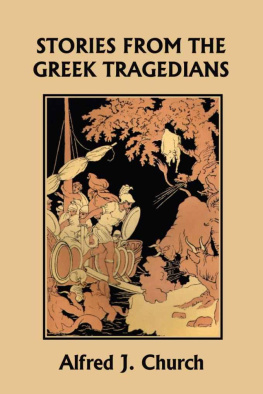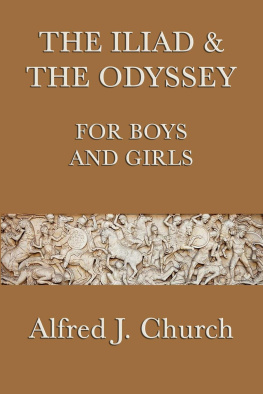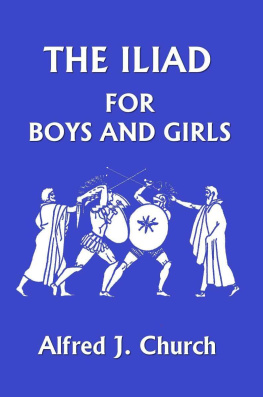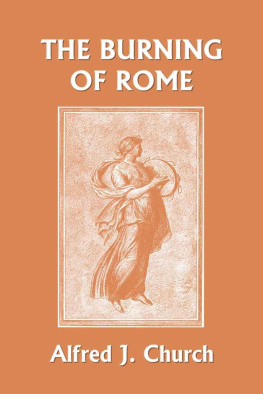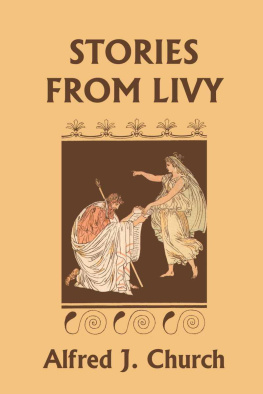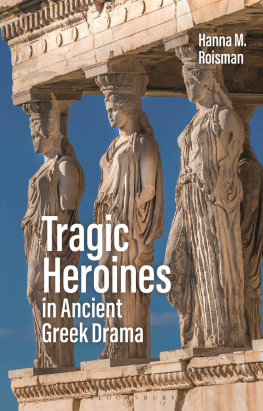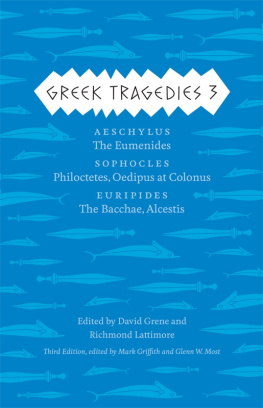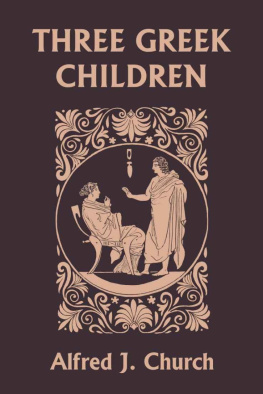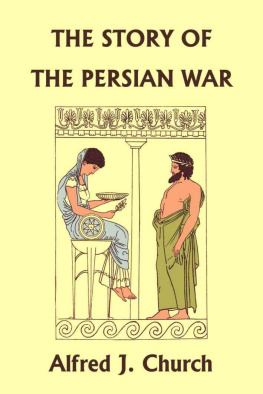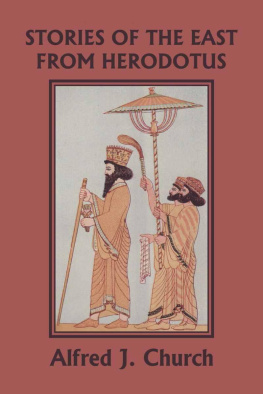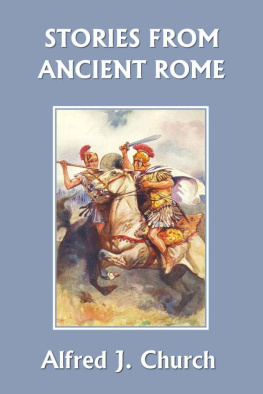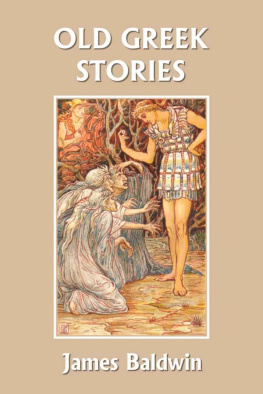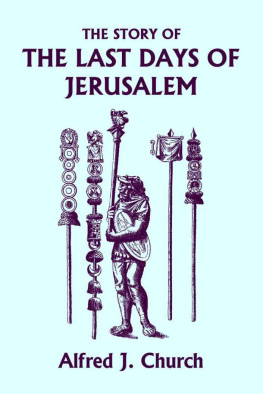Alfred J. Church - Stories from the Greek Tragedians
Here you can read online Alfred J. Church - Stories from the Greek Tragedians full text of the book (entire story) in english for free. Download pdf and epub, get meaning, cover and reviews about this ebook. year: 2008, publisher: Yesterdays Classics, genre: Science. Description of the work, (preface) as well as reviews are available. Best literature library LitArk.com created for fans of good reading and offers a wide selection of genres:
Romance novel
Science fiction
Adventure
Detective
Science
History
Home and family
Prose
Art
Politics
Computer
Non-fiction
Religion
Business
Children
Humor
Choose a favorite category and find really read worthwhile books. Enjoy immersion in the world of imagination, feel the emotions of the characters or learn something new for yourself, make an fascinating discovery.
- Book:Stories from the Greek Tragedians
- Author:
- Publisher:Yesterdays Classics
- Genre:
- Year:2008
- Rating:5 / 5
- Favourites:Add to favourites
- Your mark:
- 100
- 1
- 2
- 3
- 4
- 5
Stories from the Greek Tragedians: summary, description and annotation
We offer to read an annotation, description, summary or preface (depends on what the author of the book "Stories from the Greek Tragedians" wrote himself). If you haven't found the necessary information about the book — write in the comments, we will try to find it.
Stories from the Greek Tragedians — read online for free the complete book (whole text) full work
Below is the text of the book, divided by pages. System saving the place of the last page read, allows you to conveniently read the book "Stories from the Greek Tragedians" online for free, without having to search again every time where you left off. Put a bookmark, and you can go to the page where you finished reading at any time.
Font size:
Interval:
Bookmark:
All rights reserved. No part of this book may be reproduced or retransmitted in any form or by any means without the written permission of the publisher.
This edition, first published in 2010 by Yesterday's Classics, an imprint of Yesterday's Classics, LLC, is an unabridged republication of the work originally published by Seeley, Jackson & Halliday in 1880. This title is available in a print edition (ISBN 978-1-59915-079-6).
Yesterday's Classics republishes classic books for children from the golden age of children's literature, the era from 1880 to 1920. Many of our titles are offered in high-quality paperback editions, with text cast in modern easy-to-read type for today's readers. The illustrations from the original volumes are included except in those few cases where the quality of the original images is too low to make their reproduction feasible. Unless specified otherwise, color illustrations in the original volumes are rendered in black and white in our print editions.
I have added to the "Story of the Seven Chiefs against Thebes" the description of the single combat between Eteocles and Polynices, which occurs in the Phniss of Euripides. Some changes have been made in the "Story of Ion" to make it more suitable for the purpose of this book. Throughout the Stories compression and omission have been freely used. I can only ask the indulgence of such of my readers as may be familiar with the great originals of which I have given these pale and ineffectual copies.
R ETFORD
October . 11, 1879.
A SCLEPIUS, the son of Apollo, being a mighty physician, raised men from the dead. But Zeus was wroth that a man should have such power, and so make of no effect the ordinance of the Gods. Wherefore he smote Asclepius with a thunderbolt and slew him. And when Apollo knew this, he slew the Cyclops that had made the thunderbolts for his father Zeus, for men say that they make them on their forges that are in the mountain of Etna. But Zeus suffered not this deed to go unpunished, but passed this sentence on his son Apollo, that he should serve a mortal man for the space of a whole year. Wherefore, for all that he was a god, he kept the sheep of Admetus, who was the Prince of Pher in Thessaly. And Admetus knew not that he was a god; but, nevertheless, being a just man, dealt truly with him. And it came to pass after this that Admetus was sick unto death. But Apollo gained this grace for him of the Fates (which order life and death for men), that he should live, if only he could find some one who should be willing to die in his stead. And he went to all his kinsmen and friends and asked this thing of them, but found no one that was willing so to die; only Alcestis his wife was willing.
And when the day was come on the which it was appointed for her to die, Death came that he might fetch her. And when he was come, he found Apollo walking to and fro before the palace of King Admetus, having his bow in his hand. And when Death saw him, he said
"What doest thou here, Apollo? Is it not enough for thee to have kept Admetus from his doom? Dost thou keep watch and ward over this woman with thine arrows and thy bow?"
"Fear not," the god made answer, "I have justice on my side."
"If thou hast justice, what need of thy bow?"
" 'Tis my wont to carry it."
"Ay, and it is thy wont to help this house beyond all right and law."
"Nay, but I was troubled at the sorrows of one that I loved, and helped him."
"I know thy cunning speech and fair ways; but this woman thou shalt not take from me."
"But consider; thou canst but have one life. Wilt thou not take another in her stead?"
"Her and no other will I have, for my honour is the greater when I take the young."
"I know thy temper, hated both of Gods and of men. But there cometh a guest to this house, whom Eurystheus sendeth to the snowy plains of Thrace, to fetch the horses of Lycurgus. Haply he shall persuade thee against thy will."
"Say what thou wilt; it shall avail nothing. And now I go to cut off a lock of her hair, for I take these firstfruits of them that die."
In the meantime, within the palace, Alcestis prepared herself for death. And first she washed her body with pure water from the river, and then she took from her coffer of cedar her fairest apparel, and adorned herself therewith. Then, being so arrayed, she stood before the hearth and prayed, saying, "O Queen Her, behold! I depart this day. Do thou therefore keep my children, giving to this one a noble husband and to that a loving wife." And all the altars that were in the house she visited in like manner, crowning them with myrtle leaves and praying at them. Nor did she weep at all, or groan, or grow pale. But at the last, when she came to her chamber, she cast herself upon the bed and kissed it, crying, "I hate thee not, though I die for thee, giving myself for my husband. And thee another wife shall possess, not more true than I am, but, maybe, more fortunate!" And after she had left the chamber, she turned to it again and again with many tears. And all the while her children clung to her garments, and she took them up in her arms, the one first and then the other, and kissed them. And all the servants that were in the house bewailed their mistress, nor did she fail to reach her hand to each of them, greeting him. There was not one of them so vile but she spake to him and was spoken to again.
After this, when the hour was now come when she must die, she cried to her husband (for he held her in his arms, as if he would have stayed her that she should not depart), "I see the boat of the dead, and Charon standing with his hand upon the pole, who calleth me, saying. 'Hasten; thou delayest us;' and then again, 'A winged messenger of the dead looketh at me from under his dark eyebrows, and would lead me away. Dost thou not see him?' " Then after this she seemed now ready to die, yet again she gathered strength, and said to the King, "Listen, and I will tell thee before I die what I would have thee do. Thou knowest how I have given my life for thy life. For when I might have lived, and had for my husband any prince of Thessaly that I would, and dwelt here in wealth and royal state, yet could I not endure to be widowed of thee and that thy children should be fatherless. Therefore I spared not myself, though thy father and she that bare thee betrayed thee. But the Gods have ordered all this after their own pleasure. So be it. Do thou therefore make this recompense, which indeed thou owest to me, for what will not a man give for his life? Thou lovest these children even as I love them. Suffer them then to be rulers in this house, and bring not a step-mother over them who shall hate them and deal with them unkindly. A son, indeed, hath a tower of strength in his father. But, O my daughter, how shall it fare with thee, for thy mother will not give thee in marriage, nor be with thee, comforting thee in thy travail of children, when a mother most showeth kindness and love. And now farewell, for I die this day. And thou, too, farewell, my husband. Thou losest a true wife, and ye, too, my children, a true mother."
Then Admetus made answer, "Fear not, it shall be as thou wilt. I could not find other wife fair and well born and true as thou. Never more shall I gather revellers in my palace, or crown my head with garlands, or hearken to the voice of music. Never shall I touch the harp or sing to the Libyan flute. And some cunning craftsman shall make an image fashioned like unto thee, and this I will hold in my arms and think of thee. Cold comfort indeed, yet that shall ease somewhat of the burden of my soul. But oh! that I had the voice and melody of Orpheus, for then had I gone down to Hell and persuaded the Queen thereof or her husband with my song to let thee go; nor would the watch-dog of Pluto, nor Charon that ferrieth the dead, have hindered me but that I had brought thee to the light. But do thou wait for me there, for there will I dwell with thee; and when I die they shall lay me by thy side, for never was wife so true as thou."
Font size:
Interval:
Bookmark:
Similar books «Stories from the Greek Tragedians»
Look at similar books to Stories from the Greek Tragedians. We have selected literature similar in name and meaning in the hope of providing readers with more options to find new, interesting, not yet read works.
Discussion, reviews of the book Stories from the Greek Tragedians and just readers' own opinions. Leave your comments, write what you think about the work, its meaning or the main characters. Specify what exactly you liked and what you didn't like, and why you think so.

